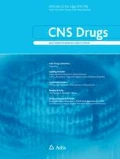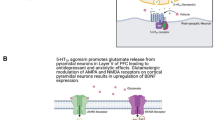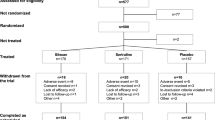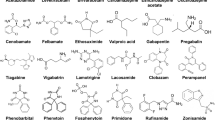Summary
Extracts of the plant Hypericum perforatum (St John’s Wort) have been used in herbal medicine since antiquity. In Germany, such extracts currently outsell fluoxetine as a treatment for depression. The active constituent of hypericum extracts is unknown, but does not appear to be hypericin, the constituent by which the extracts are standardised.
Hypericum exhibits many of the effects of other antidepressants in animal models of depression. Clinical data indicate that hypericum is an effective anti-depressant. In the 14 double-blind placebo-controlled trials that have been performed to date, 55.1% of patents receiving hypericum were classified as responders (defined as those patients showing a 50% reduction in the severity of depression from baseline), compared with 22.3% of patients receiving placebo. In similar comparative trials, hypericum was shown to be as effective as standard tricyclic antidepressants (imipramine, amitriptyline and maprotiline).
Hypericum appears to be very well tolerated. In a recent comparative trial, 63% of patients receiving hypericum (LI 160) reported that they experienced no adverse effects during treatment. In contrast, only 36% of amitriptyline-treated patients reported no adverse effects (p < 0.05). Hypericum was also associated with significantly less dry mouth and drowsiness than amitriptyline. Photosensitivity has been reported in cows that have eaten large quantities of hypericum; however, no cases of photosensitivity have been reported in humans.
Data indicate that hypericum is a well tolerated alternative to synthetic drugs for the treatment of mild-to-moderate depression, particularly in patients who are intolerant of standard antidepressants. Trials comparing the effect of hypericum with selective serotonin (5-hydroxytryptamine; 5-HT) reuptake inhibitors and other newer antidepressants, and assessing the effect of higher dosages in patients with severe depression, are required to fully determine the place of hypericum in the treatment of depressive illness.
Similar content being viewed by others
References
Lohse MJ, Muller-Oerlinghausen B. In: Schwabe U, Paffrath D, editors. Arznieverordnungsreport ’94. Stuttgart: Gustav Fischer, 1994: 354–70
Monthly marketing data. Institute for Medical Statistics. Frankfurt: IMS, 1997 Dec
Coffey T. The history and folklore of North American wild-flowers. Boston: Houghton Mifflin, 1993: 64-6
Grigson G. The Englishman’s flora. London: Hart-Davis, MacGibbon, 1958: 83–9
Porcher FP. Resources of the southern fields and forests: medical, economical and agricultural: prepared and published by order of the surgeon-general. Richmond (VA) 1863. Reprint. New York: Arno Press, 1970
Nahrstedt A, Butterweck V. Biologically active and other constituents of the herb of Hypericum perforation. Pharmacopsychiatry 1997; 30 Suppl. II: 129–34
Cott JM. In vitro receptor binding and enzyme inhibition by Hypericum perforatum extract. Pharmacopsychiatry 1997; 30 Suppl. II: 108–12
Müller WE, Rolli M, Schäfer C, et al. Effects of hypericum extract (LI 160) in biochemical models of antidepressant activity. Pharmacopsychiatry 1997; 30 Suppl. II: 102–7
Teufel-Mayer R, Gleitz J. Effects of long-term administration of hypericum extracts on the affinity and density of the central serotonergic 5-HT1A and 5-HT2A receptors. Pharmacopsychiatry 1997; 30 Suppl. II: 113–6
Özturk Y, Aydin S, Özturk N, et al. Effects of certain hypericum species on the central nervous system of mice [abstract]. Phytomedicine Int J Phytother Phytopharmacol 1996/7; 3 Suppl. 1: 102
Özturk YTesting of antidepressant effects of hypericum species on animal models. Pharmacopsychiatry 1997; 30 Suppl. 2: 125–8
Butterweck V, Wall A, Liefl: ander-Wulf, et al. Effects of the total extract and fractions of Hypericum perforatum in animal assays for antidepressant activity. Pharmacopsychiatry 1997; 30 Suppl. II: 117–24
Winterhoff H, Butterweck V, Nahrstedt A, et al. Pharmacologische Untersuchungen zur antidepressiven Wirkung von Hypericum perforatum L. In: Loew D, Rietbrock N, editors. Phytopharmaca im forschund Klinischer anwendung. Steinkopf: Dannstadt, 1995: 39–56
Brockmöller J, Reum T, Bauer S, et al. Hypericin and pseudohypericin: pharmacokinetics and effects on photosensitivity in humans. Pharmacopsychiatry 1997; 30 Suppl. 2: 94–101
Linde K, Ramirez G, Mulrow CD, et al. St John’s Wort for depression: an overview and meta-analysis of randomised clinical trials. BMJ 1996; 313: 253–8
Hänsgen KD, Vesper J, Ploch M. Multi-center double-blind study examining the antidepressant effectiveness of hypericum extract LI 160. J Geriatr Psychiatry Neurol 1994; 7 Suppl. 1: 15–8
Halama P. Wirksamkeit des Johanniskrautextractes LI 160 bei depressiver Verstimmung. Nervenheilkunde 1991; 10: 250–3
Harrer G, Schmidt U, Khun U. ‘Alternative’ depressions-behandlungmit einem hypericum-extrakt. Therapiewoche Neurologie-Psychiatrie 1991; 5: 710–6
Hoffman J, Kuhl ED. Therapie von depressiver zustanden mit hypericin. Z Allgemeinmed 1979; 55: 776–82
Hübner WD, Lande S, Podzuweit H. Hypericum treatment of mild depression with somatic symptoms. J Geriatr Psychiatry Neurol 1994; 7 Suppl. 1: 12–5
Konig CD. Hypericum perforatum L (gemeines Johanniskraut) als Therapeutikum bei depressiven Verstimmungszustanden: eine Alternative zu synthetischen Arzneimittelm [thesis]. Basel: University of Basel, 1993
Lehrl S, Woelk H. Ergebnisse von Messungen der kognitiven Leistungsfähigkeit bei Patienten unter der Therapie mit Johanniskraut. Nervenheilkunde 1993; 12: 281–4
Osterheider M, Schmidtke A, Beckmann H. Behandlung depressiver Syndrome mit Hypericum (Johanniskraut): eine placebokontrollierte Doppelblindstudie. Fortschr der Neurologie-Psychiatrie 1992; 60 Suppl. 2: 210–1
Quandt J, Schmidt U, Schenk N. Ambulante Behandlung leichter und mittelschwerer depressiver Verstimmungen. Der Allgemeinarzt 1993; 2: 97–102
Reh C, Laux P, Schenk N. Hypericum-Extrakt bei Depressionen: eine wirksame Alternative. Therapiewoche 1992; 42: 1576–81
Schlich D, Braukmann F, Beckmann H. Behandlung depressiver Zustände mit Hypericin. Zur Therapie depressiver Verstimmungen. Psycho 1987; 13: 440–7
Schmidt U, Schenk N, Schwartz I, et al. Zur Therapie depressiver Verstimmungen. Psycho 1989; 15: 665–71
Schmidt U, Sommer H. Johanniskraut-Extrakt zur ambulanten Therapie der Depression. Fortschr Med 1993; 111: 339–42
Sommer H, Harrer G. Placebo-controlled double-blind study examining the effectiveness of a hypericum preparation in 105 mildly depressed patients. J Geriatr Psychiatry Neurol 1994; 7 Suppl.: 9–11
Ditzler K, Gessner B, Schatton WFH, et al. Clinical trial on Neuropas versus placebo in patients with mild to moderate depressive symptoms: a placebo-controlled, randomised double-blind study. Complementary Ther Med 1994; 2: 5–13
Bergmann R, Nubner J, Demling J. Behandlung leichter bis mittelschwerer depressionen. Therapiewoche Neurologie-Psychiatrie 1993; 7: 235–40
Harrer G, Hubner WD, Podzuweit H. Effectiveness and tolerance of the hypericum extract LI 160 compared to maprotiline: a multi-center double-blind study. J Geriatr Psychiatry Neurol 1994; 7 Suppl.: 24–8
Kugler J, Weidenhammer W, Schmidt A, et al. Therapie depressiver Zustände. Z Allgemeinmed 1990; 66: 21–9
Vorbach EU, Hubner WD, Arnoldt KH. Effectiveness and tolerance of the hypericum extract LI 160 in comparison with imipramine: randomized double-blind study in 135 outpatients. J Geriatr Psychiatry Neurol 1994; 7 Suppl. 1: 19–23
Warnecke G. Beeinflussung klimacterische Depressionen. Z Allgemeinmed 1986; 62: 1111–3
Vorbach EU, Arnold KH, Hubner WD. Efficacy and tolerability of St Johns Wort extract hypericum extract LI 160 in patients with severe depressive incidents according to ICD-10. Pharmacopsychiatry 1997; 30 Suppl.: 81–5
Kniebel R, Burchard JM. Therapie depressiver Verstimmungen in der praxis. Z Allgemeinmed 1986; 64: 689–96
Steger W Depressiver Verstimmungen. Z Allgemeinmed 1985; 61: 914–8
World Health Organization. International classification of diseases. 9th rev. Geneva: World Health Organization, 1988
World Health Organization. International classification of diseases. 10th rev. Geneva: World Health Organization, 1992
American Psychiatric Association. Diagnostic and statistical manual of mental disorders. 3rd rev. ed. Washington, DC: American Psychiatric Association, 1987
American Psychiatric Association. Diagnostic and statistical manual of mental disorders. 4th ed. Washington, DC: American Psychiatric Association, 1994
Wheatley D. LI 160, an extraxt of St. John’s Wort, versus amitriptyline in mildy to moderately depressed outpatients — a controlled 6-week clinical trial. Pharmacopsychiatry 1997; 30 Suppl. II: 77–80
Lane R, Baldwin D, Preskorn S. The SSRIs: advantages, disadvantages and differences. J Psychopharmacol 1995; 9(2): 163–78
Woelk H, Burkhard G, Grunwald J. Benefits and risks of the Hypericum extract LI 160: drug monitoring with 3250 patients. J Geriatr Psychiatry Neurol 1994; 7 Suppl. 1: 34–8
Leuschner J. Preclinical toxicological profile of hypericum extract LI 160 [abstract]. Phytomedicine Int J Phytother Phytopharmacol 1996/7; 3 Suppl. 1: 104
Beaumont G, Baldwin D, Lader M. A criticism of the practice of prescribing subtherapeutic doses of antidepressants for the treatment of depression. Hum Psychopharmacol 1996; 11: 283–91
Dunbar GC, Cohn LF, Feighner JP. A comparison of paroxetine, imipramine and placebo in depressed outpatients. Br J Psychiatry 1991; 159: 394–8
Mendels J, Johnson R, Mattes J, et al. Efficacy and safety of b.i.d. doses of venlafaxine in a dose-response study: Psychopharmacol Bull 1993; 29: 169–74
Rosenberg C, Damso N, Fuglum E, et al. Citalopram and imipramine in the treatment of depressive patients in general practice: a Nordic multicentre clinical study. Int Clin Psychopharmacol 1994; 9 Suppl. 1: 41–8
Fish D. What is an effective dose? [letter] BMJ 1997; 314: 826
Moore MV. More on what is an effective dose [letter]. BMJ 1997; 314: 826
Gill G. Systematic review of all pertinent trials is required to establish guidelines [letter]. BMJ 1997; 314: 826–7
Tan RS. Low dose tricyclic antidepressants are effective in treating major depression [letter]. BMJ 1997; 314: 827
Burrows GD, Norman T. Antidepressants: clinical aspects. Stress Med 1997; 13: 167–72
Wheatley D, Smith D, editors. Psychopharmacology of cognitive and psychiatric disorders in the elderly. London: Chapman & Hall, 1997
Author information
Authors and Affiliations
Rights and permissions
About this article
Cite this article
Wheatley, D. Hypericum Extract. Mol Diag Ther 9, 431–440 (1998). https://doi.org/10.2165/00023210-199809060-00002
Published:
Issue Date:
DOI: https://doi.org/10.2165/00023210-199809060-00002




